Do you want to know how well you speak Spanish? If so, get an accurate level by taking the 2024 DELE test, the most famous Spanish language proficiency exam worldwide.
Recently, there has been a surge in demand for Spanish language learners. So naturally, this has increased the popularity of DELE.
You can measure your knowledge and identify your level using this Spanish test. As you progress, you learn and improve.
This post contains everything you need to know about this test. It includes benefits, test centers, dates, eligibility, levels, fees, test structure, scoring system, how to prepare, and much more.
Let’s get started!
Table of Contents
What is the DELE Test?
DELE is an acronym for Diplomas de Español Como Lengua Extranjera. In English, it refers to the “Diploma of Spanish as a Foreign Language.”
This standard exam measures the European Spanish ability of non-native candidates. By passing the test, you’ll receive an official diploma that certifies your degree of competence in the language.
DELE ensures that you have reached a certain level of Spanish skill.
Who conducts the exam?
To promote the study and teaching of the Spanish language and culture, the government of Spain started DELE in 1991. Since then, there has been an outstanding turnaround.
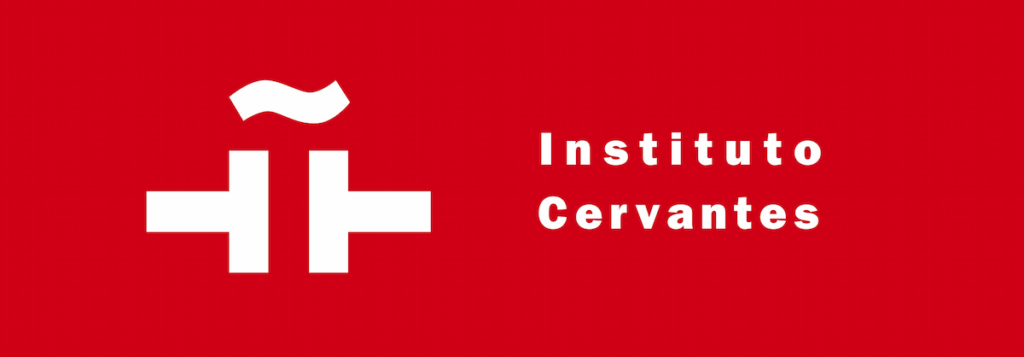
Instituto Cervantes, an international non-profit organization, conducts the DELE Spanish diploma tests. It also awards the certification.
They operate on behalf of the Ministry of Education, Culture, and Sports of the government of Spain.
The University of Salamanca in Spain designed this test. They are also responsible for correcting exams and evaluating them in the end.
Recognition & Acceptance
The DELE exam is the most reputed, extensively used, and famous Spanish proficiency test globally. It is an official diploma certifying the student’s mastery and competence in Spanish.
The Spanish government institutions award and officially recognize different variants. Over the last three decades, it has become the world’s most famous Spanish language ability test for non-natives.
Government agencies, businesses, and educational institutions have high trust in DELE. That is why almost everyone accepts these diplomas.
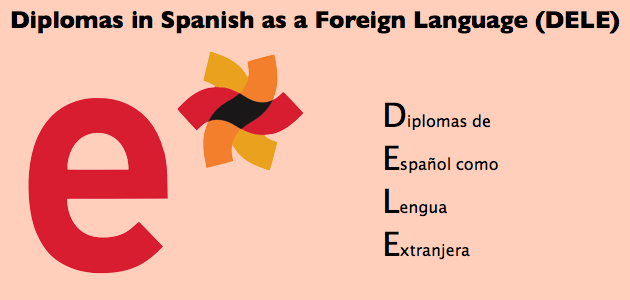
Importance and Benefits of DELE
There are many advantages of the DELE examinations. Let’s explore this in detail.
If you have been learning Spanish for a while, you may wonder which level you might be at now. Knowing your ability, even a rough idea, can help you pinpoint your weakness.
You can then focus on your shortcomings, study, and improve for the next Spanish language test. It boosts your self-confidence and makes you feel accomplished and proud. It also motivates you to continue learning Spanish.
DELE is linked with the levels of CEFR language guidelines, A1 to C2, making it easier to interpret. Also, Spanish Diplomas are officially recognized and prestigious globally. So, it is widely accepted by almost all businesses and organizations.
It helps prove your Spanish language fluency. Thus, your C.V. will look great with the certificate and enhance your employment prospects.
Do you want to study, work, or settle abroad in Spanish-speaking countries?
While this isn’t required in all cases, it can still be highly beneficial.
You can get extra points or increase your chances of getting a study visa or work permit. For example, university admission, getting a job involving Spanish, or moving to Hispanic places like Spain.
And since it never expires, you can use it forever once you pass!
This test is worth your time and hard work since it has many incentives. Honestly, there isn’t a single reason you shouldn’t take it. It has only pros and no cons!
In short, yes, go for it; it’s incredible!
Everything About Spanish DELE
There are many Spanish exams. Yet, of all the options, DELE is the most sought-after test for non-native Spanish across the globe.
Let’s find out everything about it!

What are the DELE levels?
DELE follows the guidelines of CEFR (Common European Framework of Reference for Languages). So, it has six levels, from A1 to C2.
- Level A1 – Breakthrough or Beginner
- Level A2 – Waystage or Elementary
- Level B1 – Threshold or Lower Intermediate
- Level B2 – Vantage or Upper-Intermediate
- Level C1 – Effective Operational Proficiency or Advanced
- Level C2 – Mastery or Near-Native

What are the syllabus and outline?
Levels A1 and A2: This test covers basic and lets you show communication skills on day-to-day issues. Personal, family, study, work, shopping, beginner-level talks, and reading. Also, other straightforward general activities are part of these two levels.
Levels B1 and B2: These are a tad more complex. It checks your writing ability on moderate or intermediate subjects. You will understand texts and navigate situations in various real-life scenarios. It also measures a person’s skill in expressing opinions on diverse topics.
Levels C1 and C2: The test certifies the candidate is competent in the language and has advanced skills. The tests assess your capability to understand complex texts and communicate fluently. You can also read and write about difficult topics in various fields.
Can I take any level?
The answer is yes. For higher-level exams, you don’t need a lower-level diploma.
For instance, if you feel ready for B1, you can take this test directly. You do not need to have appeared or passed A1 or A2 before.
Types of DELE exam
Two kinds of DELE exist (Diplomas de Español Como Lengua Extranjera). Here are:
(i) DELE for all
This is the standard DELE test developed for all types of learners, irrespective of level, purpose, and age. But candidates need to have a minimum age of 16.
There are six levels, from A1 to C2.
(ii) DELE for young learners
For schoolchildren, there are also DELE examinations for young learners. Children between the ages of 11 and 17 are eligible to take the test.
As far as levels are concerned, there are only two, namely A1 and A2/B1.
Test structure
You can apply for different DELE levels corresponding to the CEFRL: A1, A2, B1, B2, C1, and C2.
You should know the exam structure for each level before sitting the exam. Let’s find out!
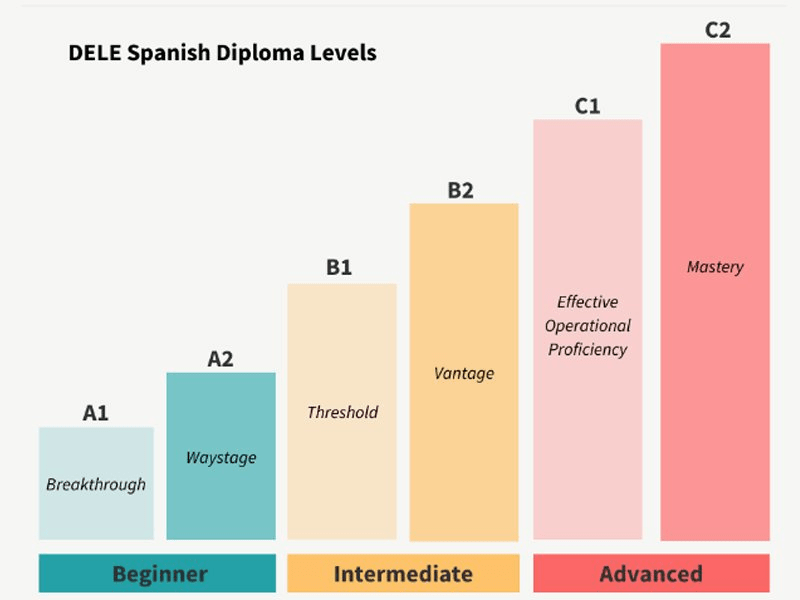
This test requires what skills?
The DELE exam comprises four essential sections, and the number of tasks, duration, and difficulty level varies. The four mandatory skill sets are:
- Reading comprehension
- Listening comprehension
- Oral expression and interaction
- Written expression and interaction
Breakdown of each level and duration
The section will show the breakdown of every level’s task, the number of questions, and times.
Level 1 (A1) — (i) Reading comprehension (45 mins, 4 tasks). (ii) Written expression & interaction (25 mins, 2 tasks). (iii) Listening comprehension (20 minutes, 4 tasks). (iv) Oral expression and interaction (15 minutes).
Level 2 (A2) — (i) Reading comprehension (60 mins, 5 tasks). (ii) Written expression & interaction (50 mins, 2 tasks). (iii) Listening comprehension (35 mins, 5 tasks). (iv) Oral expression and interaction (15 minutes).
Level 3 (B1) — (i) Reading comprehension (70 mins, 5 tasks). (ii) Written expression & interaction (60 mins, 2 tasks). (iii) Listening comprehension (40 mins, 5 tasks). (iv) Oral expression and interaction (15 mins + 15 mins for preparation).
Level 4 (B2) — (i) Reading comprehension (70 mins, 4 tasks). (ii) Written expression & interaction (80 mins, 2 tasks). (iii) Listening comprehension (40 mins, 5 tasks) (iv) Oral expression and interaction (20 minutes + 20 minutes for preparation).
Level 5 (C1) — (i) Reading comprehension (90 mins, 5 tasks). (ii) Listening comprehension (50 mins, 5 tasks). (iii) Listening comprehension, written expression & interaction (80 mins, 2 tasks). (iv) Reading comprehension, oral expression & interaction (20 minutes + 20 minutes for preparation).
Level 6 (C2) — (i) Use of language, listening, and reading comprehension (105 mins, 6 tasks). (ii) Listening and reading comprehension, written expression, and interaction (150 mins, 3 tasks). (iii) Oral expression, Reading comprehension & interaction (20 mins + 30 mins for preparation).
Syllabus & Curriculum
It is vast, and it requires extensive study. But do not worry. You can pass and achieve a higher level with a proper study plan and guidance.
You can check the entire curriculum level-wise on the official site. Here is the link to the entire syllabus.
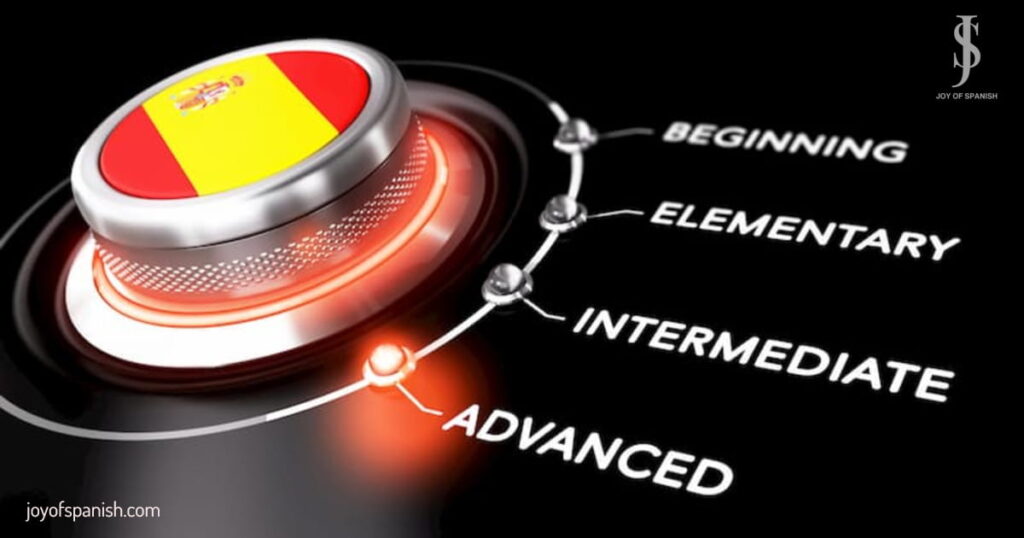
The scoring system & passing mark
One needs a “passing” grade on each test during the same exam session, which is mandatory.
Group 1 comprises (reading and writing) and group 2 (listening and speaking). Each section has 25 marks and 50 for a group. So, there is a maximum score of 100 points.
It is necessary to score at least 30 in each group of 50 marks to receive an overall “passing” grade. This is for A1, A2, B1, B2, and C1.
C2 has 3 parts. Thus, 60% on each test. A minimum score of 20 is necessary for every three tests.
There is either a PASS or a FAIL grade at the end.
When do you get your results and certificate?
You usually receive the DELE scores and results 2-3 months from the day of the test. So, for example, let’s say you took the test in the 1st week of July so that you will get it in September or October.
You can get your results online by entering your birthdate and inscription code. You will also get an email confirming the same.
All examinees in each level receive a score report. Also, they sent the diploma to the address you mentioned at registration, which may take 6 months or more.
Validity of the DELE
Unlike the SIELE diploma exam, which is valid for five years, the DELE certification never expires. Once you pass, you can use it for a lifetime with no restrictions.
This is an advantage if you want to learn Spanish to advance your career or long-term goal. So, you don’t need to retake the exam to prove your language competency.
While this diploma is valid for life, some companies or universities may have their own set of rules.
For instance, some ask for recent ones, like in the last 2-5 years, to be officially counted. Here, you may need to retake the test.
But the good news is that most consider the scores and credentials no matter when you pass the test.
DELE Test Dates
They conduct DELE exams throughout the year at several centers, and the dates are the same at every test center.
Every exam date does not include all levels. Also, many centers only offer tests a few times a year, not all the time.
One month before the exam date is the expected last date for signing up for the exam.
| 2024 Test Dates | Levels offered | Registration Deadlines |
|---|---|---|
| February 16 | Adults: A2 | Until January 10, 2024 |
| April 12 | Adults: A1, A2, B1, B2, C1 | Until February 21, 2024 |
| May 17 | Young learners: A1, A2/B1 | Until April 3, 2024 |
| May 18 | Adults: A1, A2, B1, B2, C1, C2 | Until April 3, 2024 |
| July 12 | Adults: A2, B1, B2, C1 | Until May 15, 2024 |
| September 13 | Adults: A2 | Until July 17, 2024 |
| October 18 | Adults: A2, B1, B2 | Until September 4, 2024 |
| November 22 | Young learners: A1, A2/B1 | Until October 9, 2024 |
| November 23 | Adults: A1, A2, B1, B2, C1, C2 | Until October 9, 2024 |
Test Dates 2024 in India
Except in September, the exam and registration dates are identical in India.
DELE Test centers around the world
As of January 2024, Instituto Cervantes and its partner network conducted the exam in over 1,000 testing centers in more than 100 countries.
Besides Instituto Cervantes, hundreds of universities, embassies, academies, and learning centers work as official DELE exam centers.

DELE Test centers in India
Cervantes organizes the DELE exam independently or in cooperation with other institutions.
They conducted the tests in six Indian cities – Anantapur (Andhra Pradesh), Chennai, Jaipur, Kolkata, Mumbai, and New Delhi.
| Exam Dates | Last date of Enrollment | Levels offered & Test Centers |
|---|---|---|
| February 16 (Friday) | Until January 10, 2024 | A2 – Jaipur |
| April 12 (Friday) | Until February 21, 2024 | A1, A2, B1, B2, C1 – Jaipur, Mumbai, and New Delhi |
| May 17 (Friday) | Until April 3, 2024 | Young Learners: A1, A2/B1 – New Delhi, Mumbai, and Jaipur |
| May 18 (Saturday) | Until April 3, 2024 | A1, A2, B1, B2, C1, C2 – New Delhi, Mumbai, and Jaipur |
| July 12 (Friday) | Until May 15, 2024 | A2, B1, B2, C1 – New Delhi and Jaipur |
| October 18 (Friday) | Until September 4, 2024 | A2, B1, B2 – New Delhi, Jaipur, and Mumbai |
| November 22 (Friday) | Until October 9, 2024 | Young Learners: A1, A2/B1 – New Delhi, Mumbai and Jaipur |
| November 23 (Saturday) | Until October 9, 2024 | A1, A2, B1, B2, C1, C2 – New Delhi, Kolkata, Jaipur, Mussoorie, Mumbai, and Chennai |
DELE examination Fee
DELE exam prices vary depending on the diploma level and country where you register for the exam.
The applicants can check the cost of the selected diploma at the test center in the nation where they expect to take the exam.
For example, the price is $105 to $180 in the USA. But on the other hand, it ranges from Php 2,900 to Php 6,100 in the Philippines.
Cost in India
There is a range of INR 500 to 8500 for DELE Exams in India for 2024.
For instance, ₹ 5,000 – A1 / A1 Young Learners, ₹ 5,500 – A2, ₹ 6,000 – B1 and A2/B1 Young Learners, ₹ 7,500 – B2, 8,000 – C1 and ₹ 8,500 – C2.
The existing students of Instituto Cervantes, New Delhi, also get a discount of 15% at the time of DELE registration at the Delhi center.
What are the eligibility criteria?
There are no particular conditions. You can take these exams if you are a citizen of a nation where Spanish is not the official language.
There are some age restrictions, and it depends on which version you sign up for.
For example, the minimum age is 16 to take DELE. In contrast, 11 to 17 for children interested in Dele Young learners.
Registration Process
Registration can be done online and is simple.
In most countries, Instituto Cervantes and affiliated centers administer these examinations. The embassy of Spain also facilitates the process.
Candidates must register for the test at the approved center within the time specified for each test schedule. Once the deadline is over, you cannot apply. So, keep track of dates.
Instituto Cervantes and its partner centers conduct the DELE exam in India. Thus, you can contact your nearest center, and they can help you complete the registration process.
Fill out the registration form online or in person with all the correct information like personal details, address, level, etc. You can check the sample form in the image below.
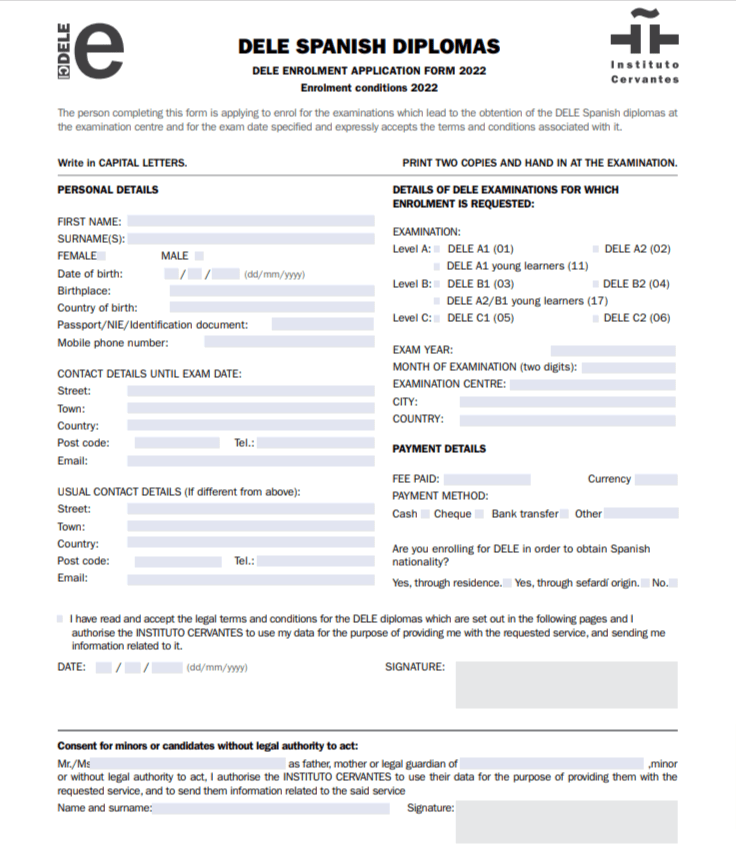
Submit the fee or transfer to the mentioned bank account of the center where you take the test. Then, finally, please fill out the application form and submit it!
How do I prepare for the DELE test?
Spanish is among the most far-reaching, taught, and favorite languages worldwide. That is why you can find abundant resources like apps to learn Spanish, books, audio lessons, podcasts, and videos. The list goes on.
Although there are many easily accessible study materials, some are also useful. Yet, it would help if you had discipline, direction, motivation, and a proper plan to study, prepare, and pass various levels.
There are no magic tricks to quickly fit endless tenses, words, connectors, irregular verbs, and tricky dialects of Spanish into your brain.
The best way to learn Spanish is through a teacher. You can take lessons from a tutor or enroll in any institute near you. With a growing demand for Spanish studies, many options are available everywhere.
To enhance your learning approach, combine formal Spanish classes with other resources. For example, read books, listen to podcasts, watch TV series, and move to improve your Spanish.
To prepare better and ensure you ace the DELE exam, check official websites to get sample papers and previous year’s questions! Plus, you have many tailor-made books to assist in your preparation.
If you’re looking for quality and result-oriented classes, try Spanish courses in Noida at LanguageNext. Our programs fit all age groups, levels, and needs, and we have offline and online modes.
We cover and prepare for other Spanish tests like Telc, DELE and SIELE.
Should you take the Spanish DELE exam?
You may want to learn how much you studied and your Spanish ability. You may require a specific level for a visa application in Spain for study or work.
You may like to show interviewers how well you know the language. So, you desire to improve your Spanish skills for career prospects.
Whatever your reasons for learning Spanish, the DELE test can add incredible value to your C.V. to edge out other contenders.
DELE is helpful because of its many test centers, regular schedules, lifetime validity, and globally accepted diplomas.
It is fruitful to make this effort to accomplish more in your personal, academic, and professional lives.
Are you planning to take this exam?

Do you have questions for me to answer? I’d love to hear what you have to say in the comments!
Most Common Frequently Asked Questions
-
What is the DELE used for?
The DELE examination is an international Spanish diploma recognized and accepted worldwide. It certifies candidates’ degrees of proficiency in the Spanish language.
-
Who can take the DELE exam?
Anyone 16 years or above and is not a native speaker from a Spanish-speaking country can take the test. The age criteria for young learners are from 11 to 17 years.
-
How many levels are in the DELE exam?
DELE adheres to the CEFR model, and thus, it has a total of six levels. It comprises A1, A2, B1, B2, C1, and C2. A1 is the easiest, and C2 is the most difficult one.
-
Is the DELE exam hard?
No. DELE is easy. The difficulty level depends on the level and your preparation. So, the same level can be easy for someone yet very difficult for another person. Following the correct technique, advice, and regular practice can help you succeed with flying numbers.
-
Is it worth taking the DELE?
Absolutely. DELE is the most valuable Spanish diploma, especially for Spanish language jobs or personal growth. It can also be hugely helpful if you go to Spanish-speaking countries for study, work, or immigration.
-
Where do I give DELE?
Instituto Cervantes and its associate network offer the DELE test in over 1,000 testing centers in over 100 countries. Check the official site to find information about your nearest center.
-
What level of DELE should I take?
That depends on your goal.
For example, if you want to gain Spanish nationality, aim for at least A2. But if you need Spanish skills for career prospects and jobs, B2 is usually the minimum requirement. And for hobby and interest, achieve whatever you wish and attainable.
-
How do I pass the DELE exam?
DELE test comprises 4 tests with equal 25 marks. To pass the test, candidates need an overall score of 60% or more in both combined reading and writing sections and combined speaking and listening.
-
Can the DELE exam be taken online?
No. DELE is an offline test. It is conducted only at the designated exam centers. But you can register online whether you want to take the test in Spain or outside the country. You do not need to be physically present to apply for this test.
-
Do I need a DELE to study in Spain or a Spanish-speaking country?
The conditions vary from one university to another. But in most cases, they commonly considered B1 the minimum level for candidates wishing to enter Spanish academics. Some also ask for B2.
-
What level of Spanish do I need to work in Spain?
If you want to live in Spain or any Hispanic nation, you need a higher level of fluency for a comfortable stay. C1 or C2 are desirable levels for professional objectives. And for personal reasons, at least target B1.
-
How do I apply for the DELE exam?
Spanish learners can apply online. You must complete and submit the form with the required identity card (e.g., passport, driver’s license, etc.). Finally, pay the fee and submit the application form.
-
How long does it take to study for DELE?
That is subjective and depends on your approach, dedication, and effort.
For example, it usually takes 12 to 24 months to cover B2 and 24 to 36 months for C1 or C2 levels. But if the goal is A1 or A2, you can achieve it in 3-9 months.
-
How long is the DELE score valid?
DELE score and diploma never expire. Once you earn it, it is valid for life.
-
Which Spanish certification is best?
The best is subjective and depends on your goal and needs. Still, DELE is the most popular and widely used Spanish language test.











